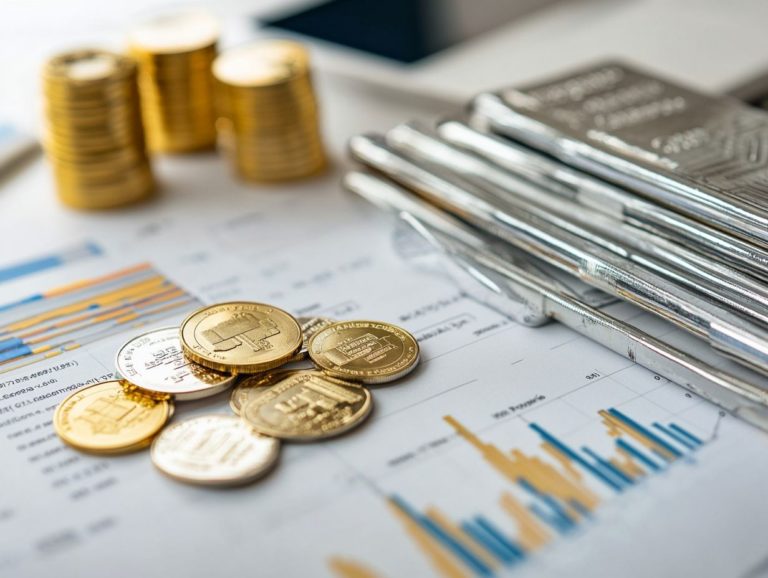Navigating the Complexities of Precious Metals Taxation
Navigating the world of precious metals can be rewarding yet complex. Understanding tax implications is essential for maximizing your returns.
This article explains what precious metals are, why they are taxed, and the types of taxes you may encounter. You will also find effective tax strategies to minimize liabilities while ensuring compliance.
Get ready to unravel the complexities of precious metals taxation!
Contents
- Key Takeaways:
- Understanding Precious Metals Taxation
- Types of Taxes on Precious Metals
- Minimizing Tax Liabilities
- Reporting and Compliance
- Important Forms and Deadlines
- Frequently Asked Questions
- What are precious metals and why are they taxed?
- How are precious metals taxed?
- Do I have to pay taxes on my personal collection of precious metals?
- Are there any tax benefits to investing in precious metals?
- Are there any exemptions or special rules for taxes on precious metals?
- What should I do if I am unsure about my tax obligations for precious metals?
Key Takeaways:
- Precious metals like gold and silver face various taxes based on their value and acquisition.
- Utilizing tax strategies can help maximize benefits and minimize liabilities.
- Complying with tax laws and deadlines is crucial for avoiding penalties and ensuring a smooth experience.
Understanding Precious Metals Taxation
Understanding the details of precious metals taxation is vital for any investor. Knowing how taxes affect investments in gold, silver, platinum, and palladium will help you make informed decisions.
Different taxes, such as capital gains tax and sales tax, can significantly affect your investment strategies. The implications can change based on the specific metal, how long you own it, and your transactions.
Staying informed about market trends and IRS guidelines is essential for making the most of your investments.
What are Precious Metals?
Precious metals like gold, silver, platinum, and palladium are valued for their rarity and beauty. They also have diverse industrial applications, making them compelling investment options.
For example, gold is known for its durability and resistance to corrosion. It symbolizes wealth and serves as a safeguard against inflation. Silver is utilized in technology and photography, attracting savvy investors despite its market volatility.
Platinum and palladium are in high demand due to their use in catalytic converters for electric vehicles. Understanding these attributes can help you include precious metals in your investment portfolio wisely.
Why are they Taxed?
Precious metals are taxed because they fall under the category of luxury goods. This presents an opportunity for significant government revenue through capital gains and sales tax.
This taxation influences your investment decisions and how you allocate your capital. The revenue from these taxes funds crucial public services, emphasizing the balance between your investment strategies and societal benefits.
Understanding these economic considerations is vital, whether you’re a seasoned investor or new to the market.
Types of Taxes on Precious Metals
As an investor in precious metals, you will encounter several taxes. These include capital gains tax, sales tax, and inheritance tax, all of which require careful consideration for optimizing your financial strategy.
Capital Gains Tax
Capital gains tax is a crucial aspect for you to consider as an investor in precious metals. It applies to the profits earned from selling your assets, affecting both long-term and short-term gains.
Understanding how this tax operates is vital for anyone aiming to enhance their investment strategies in this unpredictable market. When you sell precious metals for more than you initially paid, that difference is classified as a capital gain and is subject to taxation.
The IRS distinguishes between short-term gains, which apply to assets held for less than a year, and long-term gains for those held for longer periods, each carrying different tax rates.
To accurately report these earnings, you’ll need to fill out IRS Form 8949, detailing your transactions, and then transfer this information to Schedule D for comprehensive reporting. It’s important to understand these tax rules, as meticulous record-keeping can substantially impact your overall investment returns.
Sales Tax
Sales tax on precious metals varies by state, and it can significantly impact your total cost. This variability means you must carefully plan your transactions to ensure compliance with tax regulations as an investor.
Understanding these differences is crucial. Some states impose higher rates on bullion purchases, while others may offer exemptions based on the market value of the metals.
As you consider your buying price, it’s essential to also examine how various jurisdictions handle these tax obligations, as they can greatly influence your overall profitability.
Market dynamics play a critical role in shaping your tax compliance strategy, prompting you to adopt thoughtful transaction structuring to minimize potential liabilities. Therefore, navigating the intricate landscape of state tax regulations becomes essential for successful investments in precious metals, especially considering the financial impact of precious metals taxation.
Inheritance Tax
Inheritance tax significantly impacts the transfer of precious metals upon death, influencing wealth distribution and requiring strategic financial planning to mitigate tax implications.
This tax can substantially reduce the value of heirlooms or investments. It s crucial for you to understand how taxes affect the final distribution of your assets.
Precious metals, often regarded as a safe haven, may be subject to varying wealth taxes based on their value, creating unexpected burdens for those you leave behind.
By planning ahead, you can explore ways to legally minimize these tax liabilities, ensuring your loved ones receive the intended benefits of your wealth. Consulting financial advisors who know estate planning will help you navigate these tax issues effectively.
Tax Strategies for Investing in Precious Metals
Implementing effective tax strategies is crucial for you as an investor in precious metals. By doing so, you can maximize your tax benefits and minimize your tax liabilities, while skillfully navigating the intricate landscape of tax regulations.
Maximizing Tax Benefits
Maximizing tax benefits when investing in precious metals can significantly boost your overall profitability. This allows you to take full advantage of tax-free investments and strategic tax perks.
By understanding the intricacies of different investment vehicles, including IRAs dedicated to precious metals, you can seize tax-deferred growth opportunities that enhance your financial position.
Implementing tax-loss harvesting strategies lets you sell losing investments to offset gains and reduce taxes, ensuring that your tax liabilities remain minimized.
Staying informed about current tax laws and any potential changes is equally crucial. By incorporating these methods into a comprehensive investment strategy, you safeguard your capital and have the potential to amplify returns, ultimately fostering a more resilient financial portfolio.
Ready to make the most of your precious metals investments? Start planning your tax strategy today!
Minimizing Tax Liabilities
Minimizing tax liabilities is an essential objective for you as an investor in precious metals. Achieving this requires a solid understanding of cost basis and effective tax strategies to fulfill your tax obligations.
By accurately calculating your cost basis, you can ensure you’re taxed only on actual gains, not inflated figures. This means meticulously tracking the purchase price and any additional costs linked to your asset acquisitions.
Exploring various tax strategies can significantly lighten your tax burden. You might consider utilizing tax-deferred accounts, which are accounts where you don’t pay taxes until you withdraw funds. Additionally, you can also use tax-loss harvesting techniques to offset gains. Staying updated on current tax laws and regulations enables you to make informed decisions that align with your financial aspirations.
Reporting and Compliance
Reporting and compliance are vital elements of precious metals investing. They guide you to adhere to tax regulations while ensuring you meet crucial deadlines for tax reporting.
By staying on top of these requirements, you can navigate the complexities of your investments with confidence and peace of mind.
Important Forms and Deadlines
Two essential forms for tax reporting on your precious metals transactions are IRS Form 8949 and Schedule D. You must file these by the specified deadlines to maintain tax compliance.
Understanding how to accurately complete these forms is crucial for anyone involved in buying or selling precious metals. Discrepancies or errors can lead to unwanted penalties or even audits.
When you fill out IRS Form 8949, remember to report each transaction separately. Detail the date acquired, date sold, proceeds, cost basis, and any necessary adjustments. Schedule D acts as a summary of all your capital gains and losses, directly tying back to Form 8949.
It’s vital to submit these forms by the annual April 15 deadline! This really emphasizes how crucial timely tax reporting is and strict adherence to IRS regulations, ensuring a smooth and hassle-free tax season.
Frequently Asked Questions
Here are answers to common questions about precious metals and taxes:
What are precious metals and why are they taxed?
Precious metals are naturally occurring rare metals such as gold, silver, and platinum. They are taxed because they are considered valuable assets and are subject to capital gains tax when sold or exchanged.
How are precious metals taxed?
Precious metals are taxed differently depending on how they are acquired and sold. Generally, they are subject to capital gains tax when sold or exchanged and may also be subject to sales tax when purchased.
Do I have to pay taxes on my personal collection of precious metals?
If you are holding precious metals for personal use and not for investment purposes, you may be exempt from paying taxes on them. However, it is always best to consult with a tax professional to determine your specific tax obligations.
Are there any tax benefits to investing in precious metals?
Yes, there are potential tax benefits to investing in precious metals. For example, if you hold your precious metals in a self-directed IRA, any gains made from selling them will be tax-deferred until you withdraw the funds.
Are there any exemptions or special rules for taxes on precious metals?
There are certain exemptions and special rules for taxes on precious metals. For example, certain types of bullion coins are considered legal tender and may be exempt from sales tax, while others may be subject to different tax rates.
What should I do if I am unsure about my tax obligations for precious metals?
If you are unsure about your tax obligations for precious metals, it is always best to consult with a tax professional. They can help you understand the complexities of precious metals taxation and ensure that you are complying with all applicable tax laws.














